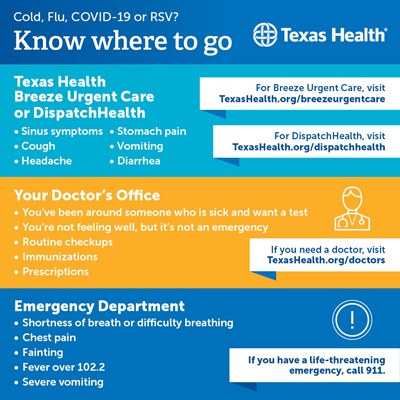When you need care quickly, it’s important to know your options, so you can make the best decision for you and your loved ones. That’s why we’re breaking down the different options for after-hours, at-home and emergency care to help you get on the road to recovery as quickly and efficiently as possible!
Urgent Care
Urgent Care centers are for medical issues that need care quickly but are not life-threatening. Urgent Care can also be helpful if you need care after typical office hours or if you feel that it can’t wait for a visit to your doctor.
Texas Health Breeze Urgent Care is open 8am to 8pm, 7 days a week, 365 days a year, including weekends and holidays. Breeze Urgent Care is efficient and complete care. Most patients get the care they need in about 30 minutes.
Every Texas Health Breeze Urgent Care is for a wide range of patients from 6 months to seniors. Additionally, every center has a pharmacy kiosk stocked with many commonly prescribed medications. Which could save you an extra trip the pharmacy.
Some conditions that can be treated at Breeze Urgent Care include:
- Allergies
- Cold or Flu Symptoms
- Earache
- Fevers
- Foreign Object in Eye or Nose
- Headaches
- Minor Allergic Reaction
- Minor Burns or Bruises
- Minor Fracture
Breeze Urgent Care offers transparent pricing, so you know what you’ll pay upfront. No surprises.
It’s important to keep in mind that Urgent Care facilities are not a substitute for regular medical care offered by a primary care provider.
In-Home Care
DispatchHealth, in collaboration with Texas Health, is bringing back the house call. DispatchHealth can bring a mobile medical team directly to your front door, seven days a week, including holidays. Each team consists of clinicians who are supported by a remote on-call emergency room physician. Prescriptions are called in to your pharmacy, and the team updates your primary care physician after the visit. DispatchHealth can test for the flu and COVID-9 for the same cost as an urgent care visit.
In-home urgent care is not a replacement for a primary care physician and regular health screenings or appointments.
Emergency Care
You might head to the Emergency Department because you feel that you will receive the quickest and most comprehensive care at the hospital. While that is true for many emergencies, if you’re not experiencing a life-threatening medical emergency, such as a heart attack or serious head injury, your wait time can be much longer than you might expect as physicians and staff tend to more time-sensitive patients.
“When patients present to the Emergency Department, staff use a method called triage to determine who is most at risk for a life-threatening emergency and should be seen first,” says Matthew Muller, M.D., an emergency medicine physician on the medical staff at Texas Health Dallas. “Thus, patients in the Emergency Department are evaluated in the order of severity of illness and risk, and not by the order of their arrival.”
This means that patients with less emergent illnesses may have to wait longer. In general, an emergency condition is one that can permanently impair or endanger your life. Some examples of conditions that need emergency medical care include:
- Difficulty breathing
- Chest pain
- Deformed fractures and fractures with open skin wounds
- Fainting or severe dizziness
- Sudden numbness or weakness
- Bleeding that cannot be stopped
- Abdominal pain that is intense and localized
- Fever with convulsions or any fever in children under 3 months old
- Confusion or rapid changes in alertness
- Coughing or vomiting blood
- Severe headache or head injury, especially if the individual is on aspirin or blood thinners
- Black or bloody diarrhea
- Sudden inability to speak, see, walk or move
You should also consider how fast your symptoms are worsening, and whether multiple symptoms are present. Multiple rapidly worsening symptoms are more concerning.
If you don’t have the symptoms listed above, you should probably consider a visit to an urgent care center or at-home urgent care. But if you are unsure or concerned, it’s always OK to head to the emergency room for evaluation.
Dial 911 or head to the nearest Emergency Department immediately for any medical problem that appears life-threatening.
So How Do I Choose?
 Ask yourself these questions to help you figure out where to be appropriately treated?
Ask yourself these questions to help you figure out where to be appropriately treated?
It is up to you to choose where you get care. Whether it’s Texas Health Breeze Urgent Care, at home with DispatchHealth, an Emergency Department, or your doctor’s office, we’ve got you covered.

